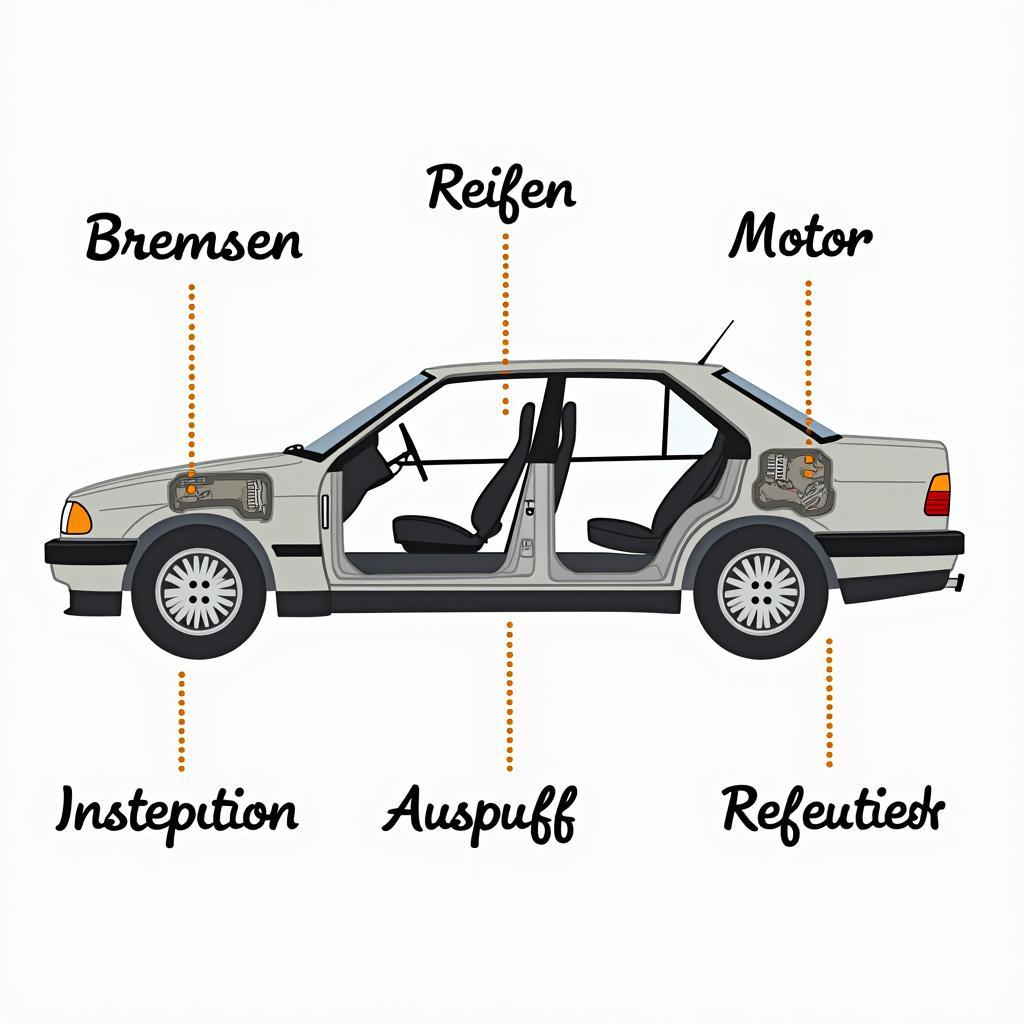German car services are known for their precision and efficiency, reflecting the engineering prowess of their automotive industry. Whether you’re looking for specific terms related to German car maintenance or simply curious about the language used in these specialized services, this guide provides valuable insights into german names for car services.
Decoding German Car Service Terminology
Understanding the nuances of German automotive terminology can be beneficial for anyone interacting with German car specialists, whether you’re a car enthusiast, a workshop owner, or simply seeking information. Let’s delve into some common German terms related to car services. “Autoservice” (car service) is a broad term encompassing various services, from “Inspektion” (inspection) to “Reparatur” (repair). “Kfz-Werkstatt” (car repair shop) is where you’d take your car for these services.
Understanding the specific terms for parts and services can greatly improve communication and ensure you receive the right service. For example, “Bremsen” (brakes), “Reifen” (tires), “Motor” (engine), and “Auspuff” (exhaust) are fundamental components often requiring service. Knowing these terms can help you articulate your needs clearly.
Navigating German Car Service Options: From Ölwechsel to TÜV
Beyond the basic terms, understanding specific services is crucial. “Ölwechsel” (oil change) is a regular maintenance requirement. “TÜV” refers to the German technical inspection association, and “Hauptuntersuchung” (main inspection) is the periodic vehicle inspection mandated in Germany. Knowing what these terms mean can be vital when maintaining a German car, even outside of Germany.
Furthermore, understanding the German approach to car service can give you valuable insights into their meticulous processes. German workshops often specialize in specific car brands, offering specialized expertise. This specialization ensures technicians are deeply familiar with the intricacies of each brand, leading to more effective and efficient service.
Why Knowing German Car Service Names Matters
Even if you don’t speak German fluently, knowing key terms can enhance your interaction with German car specialists. It demonstrates respect for their expertise and facilitates clear communication about your car’s needs. This can lead to a more satisfactory service experience and potentially even cost savings by avoiding misunderstandings.
“Having a basic grasp of German car service terminology empowers car owners to communicate effectively with mechanics,” says Hans Müller, a master mechanic with 20 years of experience specializing in German automobiles. “It ensures that the correct services are performed, ultimately leading to better car maintenance.”
Finding a Qualified German Car Service
When searching for a “Kfz-Werkstatt” specializing in German cars, look for certifications and affiliations. Ask about their experience with your specific car brand and model. A good reputation and positive customer reviews are also important indicators of quality service.
Conclusion: Mastering German Car Service Terminology
Understanding german names for car services empowers you to communicate effectively, ensuring your German car receives the precise care it requires. Whether you’re scheduling an “Inspektion” or addressing a “Reparatur,” familiarity with these terms enhances your interaction with specialists and contributes to the longevity of your vehicle.
FAQ
- What does “Autoservice” mean in German? (It means car service.)
- What is a “Kfz-Werkstatt”? (It’s a car repair shop.)
- What does “TÜV” stand for? (It stands for Technischer Überwachungsverein, a German technical inspection association.)
- What is “Ölwechsel” in German? (It means oil change.)
- Why is it important to know German car service terms? (It facilitates clearer communication with specialists.)
- Where can I find a qualified German car service? (Look for certified workshops specializing in your car brand.)
- How often should I get a “Hauptuntersuchung”? (It depends on the regulations in your country and the age of your car, but typically every two years in Germany.)
Need assistance with your German car? Contact us via WhatsApp: +1(641)206-8880 or Email: [email protected]. Our 24/7 customer support team is ready to help!

